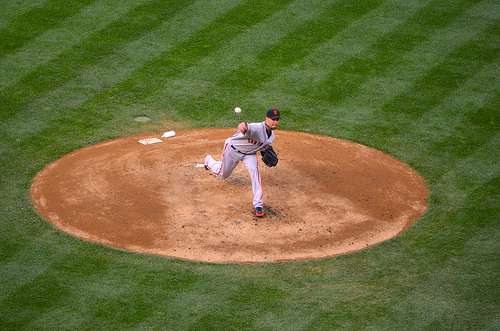Why Pro-Ball Pitchers Shouldn't Bat
Highly paid professional athletes occasionally get hurt doing things they should not be doing -- riding motorcycles, zipping down mountains on snowboards, falling asleep in tanning beds. San Francisco Giants pitcher Ryan Vogelsong is one of these. What was he doing? Batting.

He broke a pinkie and dislocated a knuckle on his throwing hand while trying to hit a pitch but somehow managing to get hit by it. The Giants will have to keep paying his $5 million salary while he recovers from performing a chore at which he is not, and is not expected to be, minimally competent. At the time of the mishap, Vogelsong was batting .071.
I once regarded the designated hitter as a hideous and cancerous blight that would inevitably lead to the collapse of civilization. I still do, but I can live with that. What I can no longer endure is the sight of gifted athletes victimized by a conspiracy to make them look like clowns.
Requiring pitchers to bat is like telling Bob Dylan to smile. It misuses their talent, lowers the quality of play, subjects them to pointless risk and probably causes irreparable loss of self-esteem.
Vogelsong is not the first to sustain wounds at the plate. Fireballer Randy Johnson, who resembled a stork chopping wood, once strained his shoulder flailing at a pitch. Boston right-hander Josh Beckett didn't even get to the plate: He hurt his back taking a practice swing. Chien-Ming Wang of the New York Yankees escaped the batter's box unharmed, only to tear a ligament in his foot rounding third base.
In 1997, when regular interleague play forced American League pitchers to bat periodically, Minnesota Twins manager Tom Kelly expressed alarm at the idea of sending any of his mound staff up to bat: "It might kill him." Only the need to avert fatalities persuaded him to make his pitchers practice hitting.
"That's why we've started swinging, because they might get hurt," confided Kelly. "Not that they're going to hit the ball. Get the muscles out of the way, and get your fingers out of the way so you don't break your fingers on the bat." A certain Giants pitcher missed the lesson.
Physical casualties are not the norm, but it's rare for anything good to happen when denizens of the hill have to heft lumber. Across the major leagues, pitchers bat a collective .091 -- or less than half what the worst-hitting position players achieve.
More than 40 percent of the time, pitchers simply strike out. That figure would be higher if they didn't take so many opportunities to bunt, on the theory that it's the only productive possibility open to them. Not productive in the sense of actually trying to reach base -- only in the sense of advancing a runner while making the inevitable out. But watching someone lay down a sacrifice bunt is a poor use of our cruelly brief time on Earth.
Besides the pitiful spectacle they present, batting pitchers distort the game, at least when the game is between an American League squad and a National League opponent. This year, under the expanded interleague schedule, that is just about every day.
The designated hitter rule does not apply in NL parks, which creates a serious disadvantage for AL teams: Their pitchers are especially terrible in an offensive role because they so rarely fill it. So far this year, NL pitchers are hitting .130, while their AL counterparts are batting just .052.
This may or may not be offset in games played in AL parks, where NL teams suffer for not having a regular DH to call on. But deliberately handicapping one team or the other in every game is not fair play or good sense.
As a National League fan, I dread the sight of a pitcher trudging to the plate. It's no fun for him, and it's no fun for me. We both know it's an empty ritual, perpetuating the fiction that he is a complete player.
If that were true, NL managers wouldn't stay up late plotting double switches to keep relievers from ever sniffing wood. Pitchers wouldn't stay in the majors despite hitting less than Reese Witherspoon's body weight.
Maybe there are pitchers out there who really love to pick up a bat. If so, let them go pound sand. It's no more pointless than trying to hit, and they probably won't hurt themselves.


Show Comments (232)